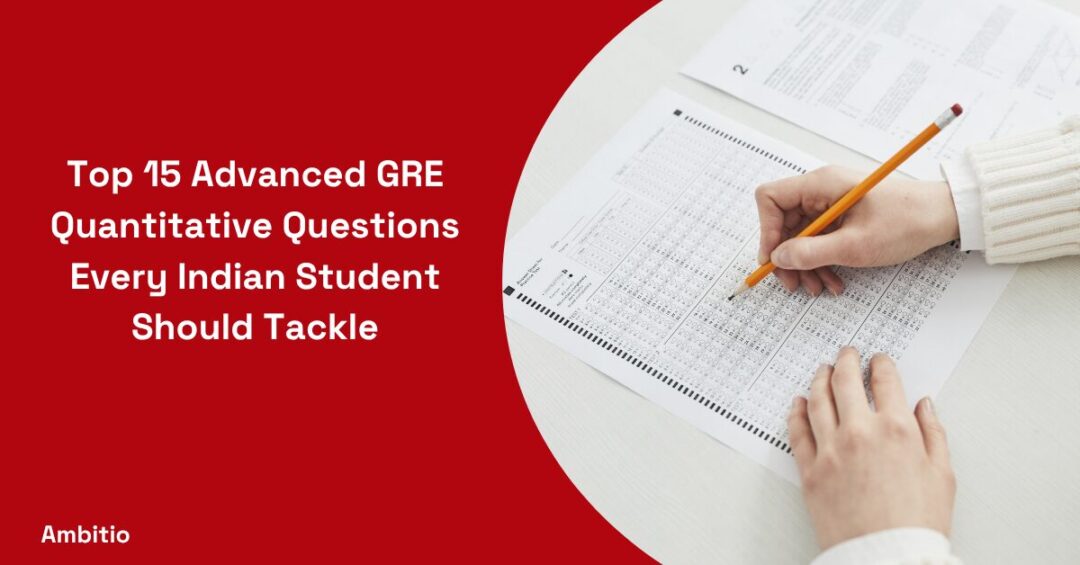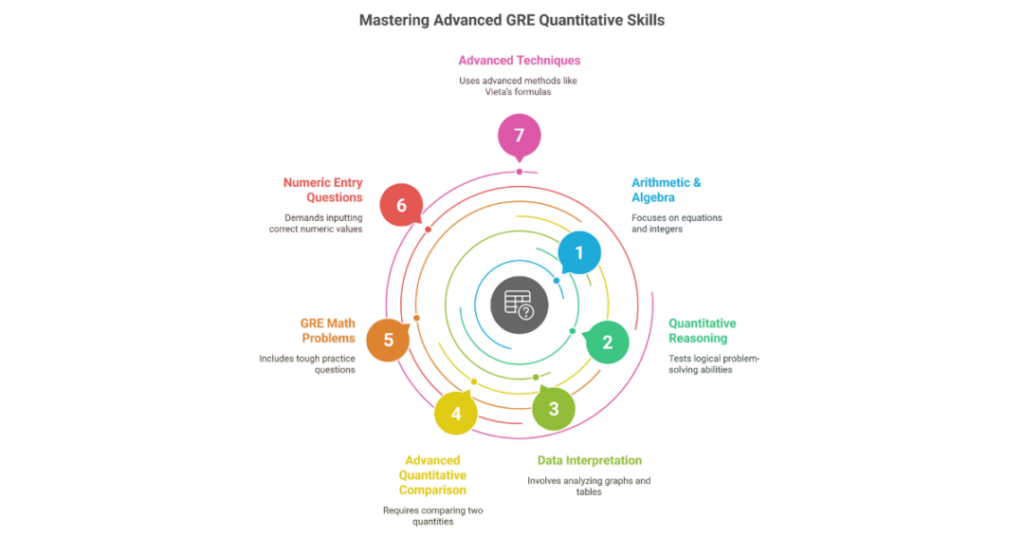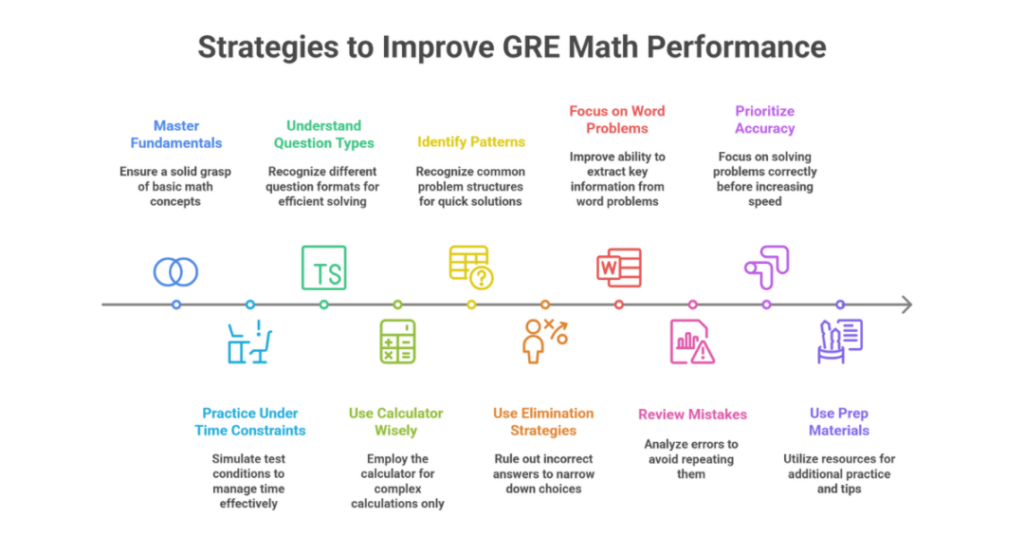4 June 2025
7 minutes read
Top 15 Advanced GRE Quantitative Questions Every Indian Student Should Tackle

Key Takeaways
- Advanced GRE quantitative questions require a strong grasp of arithmetic, algebra, and quantitative reasoning, making consistent practice essential to mastering the GRE math section.
- Practice solving the 15 hardest GRE math questions under time limits to improve both speed and accuracy, ensuring you’re ready for the quant sections.
- Use GRE prep course materials and practice questions with answers to identify patterns and strategies, boosting confidence when facing difficult GRE math problems.
The GRE Quantitative section is notorious for its advanced difficulty, especially for Indian students aiming for top scores. With questions that test everything from arithmetic to data interpretation, it’s easy to feel overwhelmed. Many students struggle with advanced GRE quantitative questions due to tricky concepts, time pressure, and unfamiliar question types like quantitative comparison and numeric entry questions.
The key to overcoming this challenge? Consistent practice with GRE math practice questions and focusing on mastering tough GRE math questions to build confidence and speed.
Key Concepts Covered in Advanced GRE Quantitative Questions
The advanced GRE quantitative section tests a variety of concepts that challenge even the most prepared students. For Indian students aiming for a GRE average score, mastering these most important GRE concepts is essential.

Here are the crucial areas covered in advanced GRE quantitative questions:
- Arithmetic & Algebra: Includes questions on GRE Arithmetic equations, integers, and satisfying equations.
- Quantitative Reasoning: Tests your ability to reason and solve complex problems using logical thought.
- Data Interpretation: Involves analyzing graphs, tables, and data sets to answer GRE quant questions.
- Advanced Quantitative Comparison: Requires comparing two quantities and determining the relationship between them.
- GRE Math Problems: Includes tough GRE math practice questions that test your understanding of algebra, probability, and more.
- Numeric Entry Questions: Demands inputting the correct numeric value in GRE math practice tests.
- Advanced GRE Quantitative Techniques: Use Vieta’s formulas and other advanced methods to solve problems like finding the value of x or the sum of the roots.
Through consistent practice with GRE prep materials, practice tests, and problem-solving techniques, you’ll be able to confidently tackle advanced GRE quantitative questions.
Top 15 Advanced GRE Quantitative Questions to Prepare
Preparing for the GRE Quantitative section can be overwhelming, especially with the advanced quant questions that test your understanding of complex concepts. For Indian students aiming for high scores, mastering these tough GRE math questions is crucial.
To help you get there, we’ve curated a list of the Top 15 Advanced GRE Quantitative Questions. These questions will challenge your quantitative reasoning and give you a clear picture of what to expect on the GRE exam.
1. Question: What is the value of xxx in the equation 3x+5=20?
- Answer: x=5
- Explanation: Subtract 5 from both sides, then divide by 3 to find x.
2. Question: If the sum of the roots of the quadratic equation 2x^2 – 4x + 3 = 0 is S, what is S?
- Answer: S=2
- Explanation: The sum of the roots of a quadratic equation ax^2 + bx + c = 0 is given by S=−b/a. Here, S=−(−4)/2=2.
3. Question: How many students in a class of 50 passed an exam if the probability of passing is 0.6?
- Answer: 30 students
- Explanation: Multiply the total number of students by the probability: 50×0.6=30
4. Question: In a data analysis question, a company’s revenue last year was $2 million. If it increased by 12%, what is the new revenue?
- Answer: $2.24 million
- Explanation: Multiply the initial revenue by1.12: 2×1.12=2.24
5. Question: A jar contains 3 red, 5 blue, and 7 green balls. What is the probability of drawing a red ball without replacement?
- Answer: 3/15=0.2
- Explanation: There are 15 balls in total, and 3 of them are red. The probability is 3/15
6. Question: Solve for x if x^2 – 4x + 4 = 0.
- Answer: x=2
- Explanation: This is a perfect square trinomial. Factoring gives (x – 2)^2 = 0, so x=2
7. Question: What is the sum of the first 10 positive integers?
- Answer: 55
- Explanation: The sum of the first n integers is n(n+1)/2. For n=10, 10(10+1)/2=55.
8. Question: If the ratio of a rectangle’s length to width is 3:4, and the length is 18, what is the width?
- Answer: 24
- Explanation: Use the ratio: width=(4/3)×18=24.
9. Question: What is the original price of an item after a 20% discount brings the price down to $80?
- Answer: $100
- Explanation: Let the original price be x. x−0.2x=80, so 0.8x=80, and x=100.
10. Question: What is the sum of the roots of the cubic equation x^3 – 6x^2 + 11x – 6 = 0?
- Answer: 6
- Explanation: The sum of the roots of a cubic equation ax^3 + bx^2 + cx + d = 0 is −b/a. Here, b=-6 and a=1, so the sum is 6.
11. Question: Which of the following is true for 3x – 7 = 5?
- Answer: x=−5
- Explanation: Subtract 3x from both sides and solve for x.
12. Question: In a GRE multiple-choice question, the answer choices are given. How do you approach such problems effectively?
- Answer: Start by eliminating obviously incorrect answer choices, then focus on solving the remaining options one by one.
- Explanation: This process helps you save time and avoid being overwhelmed by too many options.
13. Question: Solve for xxx in the equation x + 7 = 2x – 3.
- Answer: x=10
- Explanation: Subtract x from both sides, then solve the equation.
14. Question: How many GRE practice questions should you solve before test day to ensure a high score?
- Answer: Around 300–500 practice questions
- Explanation: Consistent practice with varied GRE questions is key to mastering advanced quant.
15. Question: Which of the following is an example of GRE quantitative comparison questions?
- Answer: Comparing two expressions
- Explanation: These types of questions ask you to compare two quantities and select whether one is greater, the other is greater, or they are equal.
Each of these advanced GRE quantitative questions covers important GRE topics like algebra, probability, data analysis, and quantitative reasoning. By practicing these difficult GRE math practice questions, utilizing free GRE Study materials, and following a GRE study plan, you’ll be well on your way to mastering the quantitative reasoning section and boosting your GRE quant score.
How to Improve Speed and Accuracy for Difficult GRE Math Problems?
Improving speed and accuracy in the GRE quant section can be daunting, especially when tackling advanced GRE quantitative questions. However, with focused strategies, Indian students can boost their performance in the GRE math section.

Here’s how you can enhance both speed and accuracy while solving challenging questions.
1. Master the Fundamentals
Before diving into hard GRE math practice questions, ensure that you have a solid grasp of basic concepts such as arithmetic, algebra, and geometry. The foundation is key to quickly identifying the right approach to difficult GRE math problems. Once you are comfortable with the basics, you can focus on more advanced GRE quantitative questions.
2. Practice Under Time Constraints
The GRE practice test simulates real test conditions, helping you become familiar with the time limits. Practice solving 15 hardest GRE math questions within the time allotted to each question. By doing this, you’ll develop the ability to make quicker decisions on which problem-solving methods to use. Regular practice under time constraints also helps you manage the quant sections more efficiently.
3. Understand Question Types
Understanding the different question types tested on the GRE, such as quantitative comparison questions and numeric entry questions, is crucial for improving speed. Recognizing the format will allow you to identify shortcuts or efficient strategies for solving each type. The quicker you identify the question type, the faster you can solve it.
4. Use the Calculator Wisely
While the calculator is available for certain sections, it’s important to know when and how to use it. Avoid relying too heavily on it for basic arithmetic operations, as this can slow you down. Instead, use the calculator for more complex GRE math questions like long divisions, decimals, or calculations involving fractions.
5. Identify Patterns in Practice Questions
Practicing frequently asked GRE Maths questions with answers is invaluable for identifying common patterns in GRE quantitative practice. By solving multiple GRE practice questions, you’ll begin to recognize similar problem structures, allowing you to apply the same strategies to difficult GRE math problems. For instance, quantitative comparison questions ask you to compare two quantities, a problem type that often follows a predictable solution approach.
6. Use Elimination Strategies
When faced with challenging questions, use the process of elimination to rule out clearly incorrect answers. This is especially useful in multiple-choice questions. Focus on understanding the reasoning behind each answer choice, and eliminate options that don’t fit with the correct answer based on your calculations.
7. Focus on Word Problems
Word problems can be particularly tricky, but with regular practice, you can improve your ability to extract the key information. Focus on problems involving algebraic equations, like those that ask you to find that x or solve for unknown variables. Breaking the problem down into smaller steps can help you solve hard GRE math practice questions more quickly.
8. Review Mistakes and Learn
After completing a GRE practice test, always review your mistakes thoroughly. Understand where you went wrong and identify strategies to avoid similar errors in the future. This reflection will help you improve your GRE scores by reinforcing correct methods and eliminating bad habits.
9. Focus on Accuracy First
When initially practicing, prioritize accuracy over speed. GRE preparation requires a careful balance of both, but in the beginning, focus on solving quant sections correctly before trying to improve speed. Once you are consistently answering 15 questions correctly, speed will naturally follow.
10. Use Prep Course Materials
GRE prep course materials and resources from GRE Online Coaching can be an excellent way to get additional practice and tips. They often provide comprehensive explanations for difficult questions, helping you understand how to approach various problem types, including quantitative comparison questions and more complex GRE math problems.
By applying these strategies and utilizing effective GRE test prep materials, Indian students can significantly improve both speed and accuracy in the GRE quant section. Regular practice with GRE quantitative practice and understanding the nuances of the GRE math section will help you confidently tackle difficult GRE math questions and increase your overall GRE quant score.
Conclusion
Mastering advanced GRE quantitative questions requires dedicated practice and a strategic approach. With a thorough understanding of GRE questions like numeric entry questions and skills to satisfy the equation, you’ll be well-equipped to tackle the toughest problems on sections on the GRE. Remember, every practice test is an opportunity to improve. If you’re wanting to practice, consider working through questions that are similar to those found in the real exam, be it finding the sum or dividing both sides.
Ready to take the GRE with confidence? Join Ambitio today! We specialize in profile building and will guide you step-by-step through your study abroad journey, ensuring your GRE prep is as strong as your application. Let’s shape your future together!
FAQs
Q1: What is the GRE quantitative section?
The GRE quantitative section assesses your ability to understand, analyze, and solve mathematical problems. It includes topics such as arithmetic, algebra, geometry, and data analysis.
Q2: Why should I practice advanced GRE quantitative questions?
Advanced GRE quantitative questions go beyond the basics and prepare you for the most challenging math problems on the GRE. Practicing these questions will improve your problem-solving skills and increase your confidence on test day.
Q3: Are these questions similar to those on the real GRE?
While these questions are not official GRE questions, they are designed to be similar in style and difficulty. They provide valuable practice to help you perform well on the GRE.
Q4: How can I use these questions effectively in my GRE preparation?
Use these questions to identify your weak areas and focus your study efforts. Time yourself to simulate test conditions and track your progress.
Q5: Can I use a calculator for these questions?
The GRE allows the use of an on-screen calculator for some quantitative questions. However, it’s a good idea to practice both with and without a calculator to ensure you’re prepared for any scenario.
Q6: What is the format of these practice questions?
These practice questions include quantitative comparison questions, numeric entry questions, and multiple-choice questions. They cover a wide range of GRE math topics

You can study at top universities worldwide!
Get expert tips and tricks to get into top universities with a free expert session.
Book Your Free 30-Minute Session Now! Book a call now




























